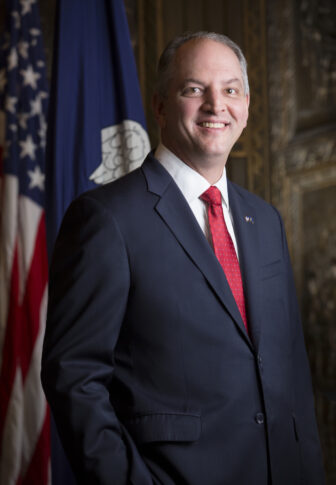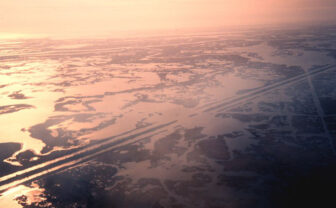
The language is harsh: “The governor’s actions today declared war on the oil and gas industry.”
So said Don Briggs, president of the Louisiana Oil and Gas Association, in response to Governor John Bel Edwards’ call for the notoriously pampered oil industry to finally pay for its destruction of the Louisiana coast. The word “war” is peppered throughout the lobbying organization’s website, always in reference to Edwards’ statements about the industry’s responsibility to pay for accelerating the degradation of the coast by destroying wetlands.
I leave the Louisiana Oil and Gas Association website thinking not of the oil industry but of the children of Aleppo, Syria, 100,000 of whom have been bombed in the last few weeks. That is war. The industry’s extreme language about defending itself provides insight into its distorted worldview. Big Oil portrays itself as the victim — a stance that only prevents the industry from honestly addressing the problems it has caused.
The harsh words and distortions extend to denying the broader impacts of climate change. The oil and gas association’s response to the connections between the August floods, climate change and fossil fuel development was that such concerns “severely lacked scientific evidence.” Severely. What are we to make, then, of a study by the National Oceanic and Atmospheric Administration that linked the floods to climate change? The fact is that carbon pollution from burning oil and other fossil fuels has warmed our planet and contributed to the Baton Rouge floods.
If it’s war Big Oil wants, it’s good to have a governor on our side who was once an Army Ranger.
Despite Big Oil’s attempt to cast itself as the injured party, the people of South Louisiana are the ones who have endured catastrophic losses. The oil and gas extractors sliced and diced coastal wetlands with canals and pipelines, then simply ignored contractual requirements to repair the landscapes they had ruined. That act of ecological vandalism, combined with the planetary carbon pollution from fossil fuels, gravely worsens the threat of storm surge and more routine flooding. Places like Baton Rouge and Lafayette that we once thought of as higher ground are now in serious jeopardy — as was demonstrated just weeks ago. Meanwhile, coastal communities and the City of New Orleans face a threat that is not less than existential.
That’s why the elected officials in parish governments, including Republicans like District Attorney Keith Stutes of Vermilion Parish, in the geographic heart of the oil country, are suing the industry to repair our coast.
Edwards would rather not sue. Time and again he has said his preference is for oil companies to meet him at the table and negotiate a settlement. This is a reasonable path, but instead the industry cries war. The oil and gas group casts the governor as a villain who has set greedy lawyers upon them. Any mention of why our coastline is destroyed conveniently omits causation. “Save the coast,” is the vacuous cry that the oil industry has heartily promoted.
Refusing to honestly address the problems oil and gas extraction has caused is a recurring theme. Ask the industry to reduce pollution and it will roll out an opinion piece, like the one in which the Louisiana Mid Continent Oil and Gas Association depicts itself as an industry hogtied by regulation and law.
In fact, the opposite is true. The laws that regulate pollution are not enforced. When the inspector general of the Environmental Protection Agency, the regulator of on-shore facilities, reviewed enforcement of environmental laws throughout the nation, he found enforcement in Louisiana to be the worst. One of the reasons is cited on page 16: “a culture in which the state agency is expected to protect industry.”
The EPA inspector general was referring to the state’s Department of Environmental Quality, but he might as well have been writing about our Department of Natural Resources. On the issue of coastal destruction, the oil industry is fervently trying to get the issue out of the courts and back under the DNR, the agency that first issued the permits.
Rather than pay up, as it should, the Louisiana Oil and Gas Association argues that DNR should begin an “administrative review” of the permits. But they should be careful what they ask for.

In signing the permits, the oil industry agreed to fill in the canals it dug for pipelines and navigation. The DNR looked the other way for half a century as the industry defaulted on that obligation. Of course the oil industry wants to let DNR continue to handle the mess, but we can all see where that kind of stewardship has gotten us.
No wonder, then, that the oil industry declares war when called to account — war on Louisiana and its people. It is simply used to having its way with us. Thank goodness for a governor who is finally standing up to this industry, if only in the realm of Louisiana’s coastal destruction.
Edwards built his gubernatorial campaign around “character,” and he is exhibiting it in defying an industry that has plenty of money to threaten him come re-election time. The TV ads have already started. But money can’t buy character, and oil industry leaders simply will not confront the hard truths about their practices.
If their failure to face the truth hurt only themselves, it wouldn’t matter. But the oil and gas interests are trying to take the state down with them in a last-ditch effort to avoid responsibility for ravaging our coast. At long last, the state of Louisiana is fighting back. If it’s war Big Oil wants, it’s good to have a governor on our side who was once an Army Ranger.
Anne Rolfes, founding director of the Louisiana Bucket Brigade, began her career in Nigeria, collaborating with local communities to address oil companies’ destruction of the Niger Delta.


